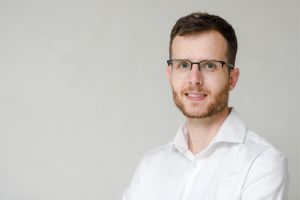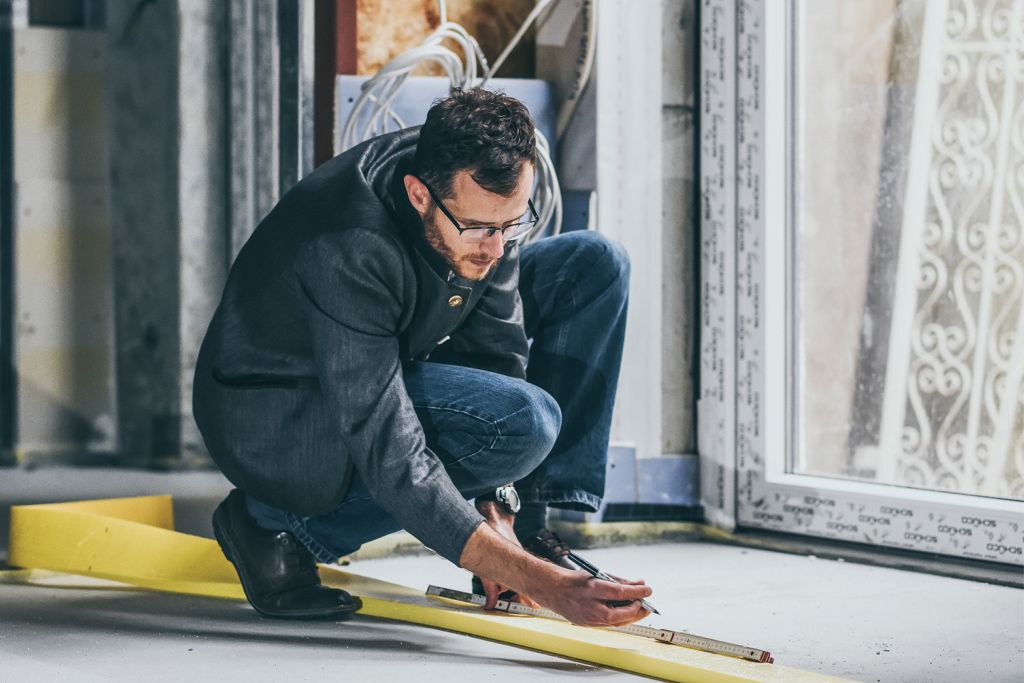The mdw-trained Tonmeister Winfried Lachenmayr is among those individuals responsible for the acoustics of the new Future Art Lab. In a conversation with mdw Magazine, he explains why working on this extraordinary building was so special to him and what makes it so unique in the context of European musical campuses.

“It makes me really happy to imagine how students and teachers will be coming and going here over the next few decades, how music will be resounding throughout this space,” says Winfried Lachenmayr of his feelings on the newly built Future Art Lab. This successful acoustic engineer is himself a former mdw student and has already spent four years teaching at the Department of Composition, Electroacoustics and Tonmeister Education. That was just one reason more for him to take joy in working on this special building, since it’s his department’s new home. “It really is a bit like building your own house,” says the Munich native with a smile, “and teaching in a space you planned yourself is something truly special.”
The mdw is where I learned how to listen.
Winfried Lachenmayr
Since graduating from the mdw in 2013, Lachenmayr has worked for the top-flight engineering firm Müller-BBM—which provides consulting, evaluation, and planning services pertaining to acoustics, building physics, and environmental protection. As part of this service portfolio, acoustic expertise is provided for the renovation of old buildings as well as for the outfitting of new ones. Well-known projects by Müller-BBM include the reconstruction of the famed opera house La Fenice in Venice as well as the renovation of Milan’s La Scala, in which Lachenmayr himself participated.
In 2015, Müller-BBM was hired to contribute its employees’ acoustic expertise to the Future Art Lab project. “Our main job was to ensure the building’s functionality in an acoustic sense. That included determining the proper orientation of the rooms relative to one another as well as figuring out suitable building acoustics—in other words, soundproofing. And how the rooms themselves would sound was my responsibility.” Lachenmayr says that the infrastructure and other features of the Future Art Lab represent something absolutely new in terms of Tonmeister training: “Both the Recording Hall’s size, which can do justice to a jazz combo, and the existence of the Sound Theatre for contemporary electroacoustic installations make for possibilities that I haven’t seen in any other places of training.”

This young acoustic engineer learned his craft from experts including former mdw professor Karlheinz Müller. Lachenmayr describes Müller’s approach to teaching as especially practice-oriented and exciting. “It was fun listening to him talk about his experiences on the job. You could really tell just how much he loves his work.” It was the prospect of working on the acoustics of rooms that he himself would visit as a concert- or theatre goer that motivated Lachenmayr to ultimately choose the profession he did. And today, he’s still enthusiastic about the idea of acting as a medium in the background, enabling music to be better conveyed. “What it all comes down to is music and emotions. And in these respects, we’re seeing more and more how spaces play a very important role.” His consulting activities take him not only to renowned opera houses and concert halls but also to institutions of a more everyday nature. “We’ve got a pretty broad range of customers, from the Gewandhaus in Leipzig to day-care centres in Lower Bavaria. And it really does keep things real when a day of work with the finest orchestral musicians is followed by a day spent helping a preschool teacher improve the noise situation in her group room.”
The Gewandhaus in Leipizig is the most prestigious concert hall I’ve been able to work in so far.
Winfried Lachenmayr
It was Müller-BBM’s collaboration with Detmold University of Music that enabled Winfried Lachenmayr to earn his doctorate in music acoustics at the Erich Thienhaus Institute in 2017. He describes that opportunity to research while remaining plugged into actual practice as work that was relevant and simultaneously helped him stay grounded. And as a qualified acoustic engineer, Lachenmayr continues to pursue his own research to this day: he’s currently investigating the acoustics of chamber music halls as a postdoctoral researcher at Aalto University in Finland. A tour this summer to take measurements in relevant spaces took him through Germany and Austria, and he hopes to ultimately produce a foundational study on chamber music hall acoustics based on this research. Pursuing personal interests is something that he encourages his students to do, as well. “I think that most people in our professions get ahead by being excellent rather than by being particularly conformist. You don’t have to force yourself to be good in all respects; you just need to be confident that whatever you find most fun is what will also lead to success sooner or later.”

